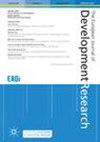通过小测验开发问题项目在X年级的MAN 1 Blitar
IF 2.6
3区 社会学
Q2 DEVELOPMENT STUDIES
引用次数: 0
摘要
本研究旨在透过测验应用程式,为X宗教1班的学生开发题目。基于对21名学生的访谈结果。在疫情期间在课堂上学习英语,许多学生在阅读技能上有困难,因为他们不能直接与老师和朋友练习。此外,作为一个学生,这使学生厌倦了单调的课程。本次研发涉及博格和盖尔设计。使用的数据收集工具是问卷调查。数据收集方法为访谈和观察。通过测验应用开发问题项的过程是研究和开发步骤:(1)潜力和问题,(2)数据收集,(3)产品设计,(4)设计验证,(5)设计修改,(6)产品测试,(7)试用,(8)产品修改。通过quizizz应用程序开发问题项的结果是研究者将问卷中的数据进行分析,然后将其与效度标准进行比较,其中70.3%的数据来自媒体专家,63%的数据来自材料专家,这意味着有效或可行使用。从教师中有79%是有效可行的,在学习中更加主动。在对有效实用的开发产品进行测试后,通过对学生满意度问卷的分析来证明这一点,并作为产品可行性的主要参考。数据结果为76.6%,这意味着学生在学习媒体应用的帮助下得到了很大的帮助和激励。本文章由计算机程序翻译,如有差异,请以英文原文为准。
Developing Question Items Through Quizizz in Grade X MAN 1 Blitar
This study aims to develop question items through quizizz application for students of class X Religious 1. Based on the results of interviews with 21 students. Learning english in the classroom during the pandemic many students have difficulty in reading skills because students cannot practice it directly with their teacher and friends. In addition to being a student, which makes students bored with monotonous lesson. This research and development refers to the Borg and Gall design. The data collection instrument used was a questionnaire. The data collection techniques were interviews and observations.The Process of developing question items through quizizz application is research and development steps are: (1) Potential and problem, (2) Data collection, (3) Product design, (4) Design validation, (5) Design revision, (6) Product testing, (7) Trial use, and (8) Product revision. The results of developing question items through quizizz application is the researcher analyzed the data from a questionnaires by presenting it and then comparing it with the validity criteria, the data obtained was 70.3% from media expert and 63% from material expert, which means valid or feasible to use. From the teacher have 79% is valid and feasible to be more active in learning. After being tested for effective and practical development products, this is evidenced by the analysis of students satisfaction questionnaires which is used as the main reference for product feasibility. The data results show 76.6% which means students are very helped and motivated by the help of learning media application from the product.
求助全文
通过发布文献求助,成功后即可免费获取论文全文。
去求助
来源期刊

European Journal of Development Research
DEVELOPMENT STUDIES-
CiteScore
5.70
自引率
4.00%
发文量
77
期刊介绍:
The European Journal of Development Research (EJDR) redefines and modernises what international development is, recognising the many schools of thought on what human development constitutes. It encourages debate between competing approaches to understanding global development and international social development. The journal is multidisciplinary and welcomes papers that are rooted in any mixture of fields including (but not limited to): development studies, international studies, social policy, sociology, politics, economics, anthropology, education, sustainability, business and management. EJDR explicitly links with development studies, being hosted by European Association of Development Institutes (EADI) and its various initiatives.
As a double-blind peer-reviewed academic journal, we particularly welcome submissions that improve our conceptual understanding of international development processes, or submissions that propose policy and developmental tools by analysing empirical evidence, whether qualitative, quantitative, mixed methods or anecdotal (data use in the journal ranges broadly from narratives and transcripts, through ethnographic and mixed data, to quantitative and survey data). The research methods used in the journal''s articles make explicit the importance of empirical data and the critical interpretation of findings. Authors can use a mixture of theory and data analysis to expand the possibilities for global development.
Submissions must be well-grounded in theory and must also indicate how their findings are relevant to development practitioners in the field and/or policy makers. The journal encourages papers which embody the highest quality standards, and which use an innovative approach. We urge authors who contemplate submitting their work to the EJDR to respond to research already published in this journal, as well as complementary journals and books. We take special efforts to include global voices, and notably voices from the global South. Queries about potential submissions to EJDR can be directed to the Editors.
EJDR understands development to be an ongoing process that affects all communities, societies, states and regions: We therefore do not have a geographical bias, but wherever possible prospective authors should seek to highlight how their study has relevance to researchers and practitioners studying development in different environments. Although many of the papers we publish examine the challenges for developing countries, we recognize that there are important lessons to be derived from the experiences of regions in the developed world.
The EJDR is print-published 6 times a year, in a mix of regular and special theme issues; accepted papers are published on an ongoing basis online. We accept submissions in English and French.
 求助内容:
求助内容: 应助结果提醒方式:
应助结果提醒方式:


